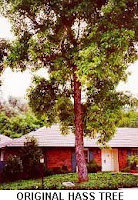The word “ahuacatl” in the Aztec Nahuatl language means "testicle" and from the “ahuacatl” of the Aztecs we get the Spanish word “aguacate”. From the Spanish word “aguacate” comes our English word "avocado". The majority of avocados that are sold in the grocery stores, vegetable stands, and supermarkets all across North America are of the “Hass” avocado variety. All Hass avocado trees are related to a single "mother tree" that was planted by a mail carrier named Rudolph Hass in La Habra Heights, California in 1926. Note that his name is Hass and the present day avocado is sometimes misspelled as “Haas”. Somewhere down the line the name becomes corrupted but I don’t know why. Perhaps it is because many people pronounce Hass as if it were spelled Haas. Mr. Hass saw a picture in a magazine of an avocado tree with dollar bills hanging all over it. He was only making twenty-five cents an hour at the time so he planted some avocado seeds that he had purchased from an avocado promoter named A.R. Rideout of Whittier, California. Mr. Rideout collected avocado seeds from many different sources and sold them to whomever would buy them. He advised Mr. Hass to plant three seeds together and when they sprouted to pick the best looking one and destroy the other two. At that point the seedling would receive a graft from an already established plant that gave good avocados. To this day no one knows where the seed that grew into the mother tree came from. As it just so happened this particular tree kept rejecting the branches that were grafted to it and Mr. Hass just let it grow anyway. He had planned to cut it down but his children convinced him that it yielded the best avocados they had ever tasted. The tree eventually gained a local reputation for great tasting avocados.
In 1935 Mr. Hass figured that he had a good thing going and decided to patent the Hass Avocado and it was the first tree to ever receive a patent. Every Hass (or Haas) avocado that is grown today is descended from that original tree. Legend has it that Mr. Hass had a weak heart from childhood and since patents are issued for a seventeen year period Mr. Hass asked God to let him live at least seventeen more years until the patent expired. Rudolph Hass died in 1952 just a few months after the expiration date of his patent. He never did make a fortune from his avocado business but he did make a good living for his family. The tree died in 2002 after 76 years of giving birth to the wonderful Hass avocados. Mrs. Hass died at the ripe old age of 98. She ate avocados every morning for breakfast. By the way, the Hass variety grows all year long so you can eat them every day too but if your stool turns green you might want to back off about half a notch.
There are many, many ways to savor the Hass avocado and recently I came across another way that I had never tried before. Cut up some peeled avocados into wedges and dip them in tempura batter and deep fry them for about a minute. I guarantee, life doesn’t get much better than this.




7 comments:
Wow, that is indeed very interesting. My husband and I have about 15 or so Hass avacado trees that we planted from the seed. Some have been in the ground for about 7 years and should be bearing fruit soon (hopefully) and the others are still in pots. These are avacado trees from the fruit we ate previously. Wow, very informative and I will print this out so my husband can read it. I love your blog. I learn something everytime I read one of your posts and I just started reading your blog today. Who knew? :)
Fun Avo Hass Read! The 25th California Avocado Festival(AVOFEST) is inked for October 7th, 8th, 9th in Carpinteria California-- This is the watermark of all festivals, I invite you to attend, it's wayyyy fun!
I just found your blog. What a treat. Loved this about avocados. I will work my way through your archives with delight!
Thanks Betsy. Welcome aboard!
What can you tell us about the smooth skinned variety also available in our state and so-o-o delicious?
amazing how many Nahua words have made it to English via Spanish... avocado from aguacate from ahuacatl, coyote from coyotl... chocolate from xocolotl (or something similar)... but i am Peruvian, & in Perú we use the term "palta" to refer to avocados. i'm not sure of the etymology of "palta," whether it is a Spanish word or it derives from one of our own indigenous languages (Quechua being the primary one with about 8 million speakers, from which words like condor & beef "jerky" [charqui, dehydrated meat used by indigenous groups]) but it seems to be unique to South America. every Latino i have encountered in the United States, whether Mexican, Central American, Puerto Rican, Cuban, Dominican, Colombian, has used aguacate. some are even unfamiliar with the usage of "palta" altogether... aguacate is definitely the most widely used word in Latin America.
cacahuate (peanuts) is probably the opposite of aguacate in that it also comes from Nahua & is used widely by Mexicans but is not understood at all in most of South America where the Spanish maní is used instead. however maní being standard Spanish is also understood in all Hispanophone countries.
goes to show how much indigenous languages shape not just local viariations of Spanish but also English.
ChokloConQueso - Thanks Bro :)
Post a Comment